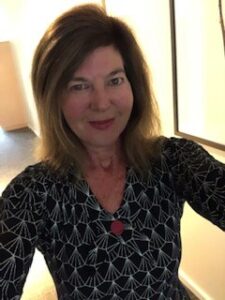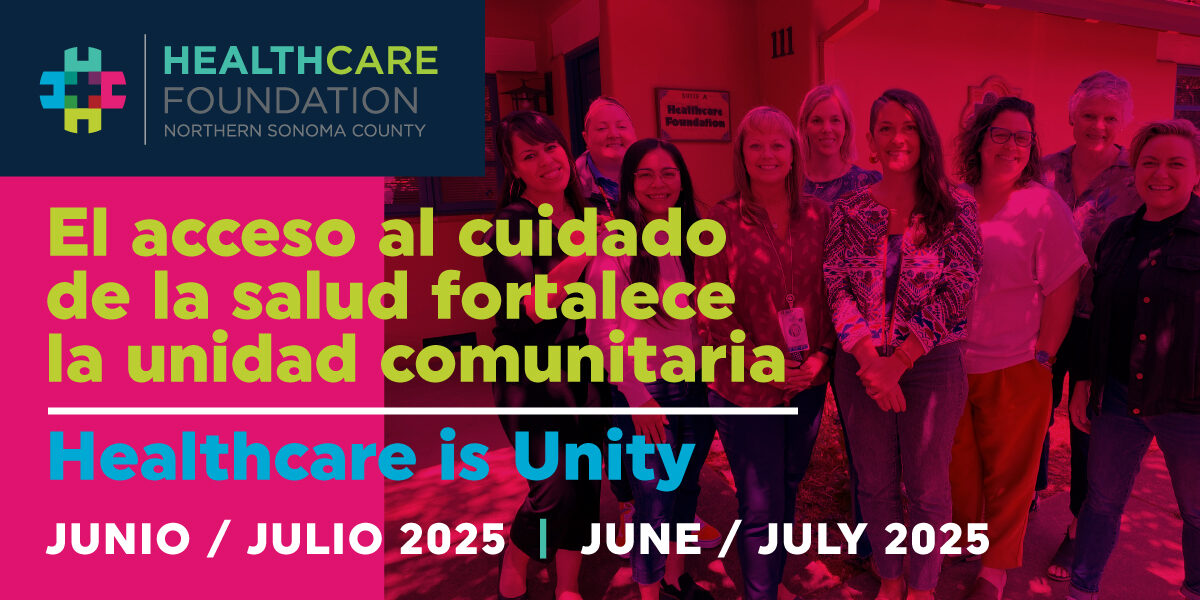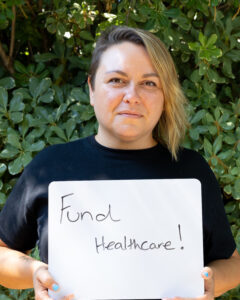
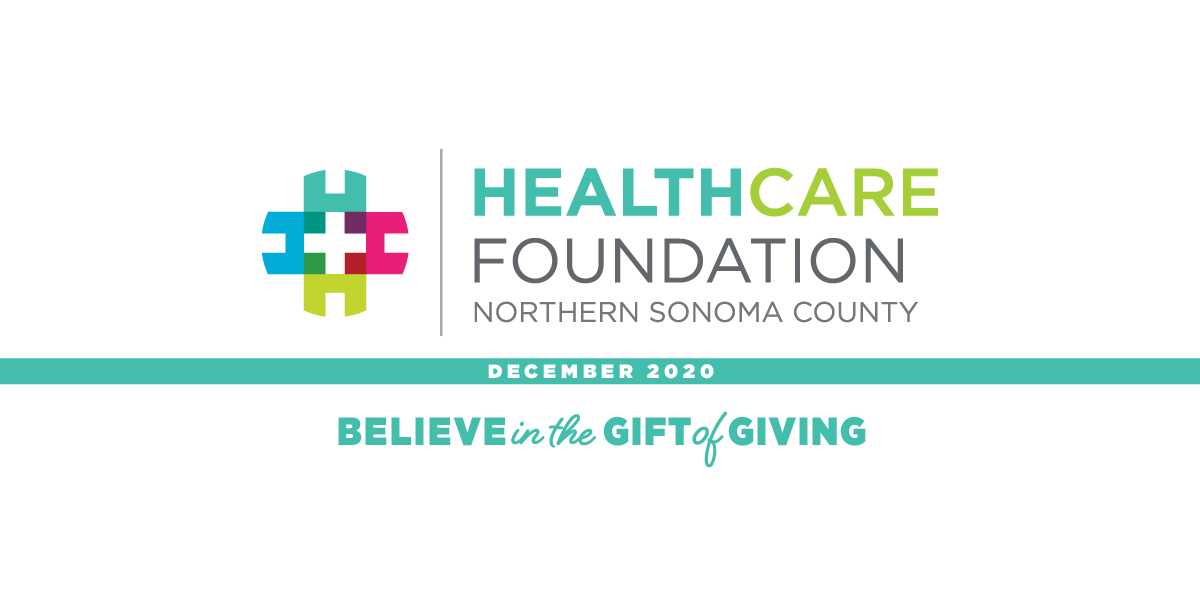
Believe in the Gift of Giving
Happy Holidays! This month, read about Windsor Wellness Partnership's work to keep Windsor fed.
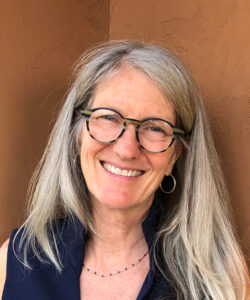
Dear Friends,
As we barrell toward the end of 2020 in search of creative, pandemic-friendly ways to bring holiday cheer to our family and friends, I hope you will consider tribute gifts, aka gifts of the heart in honor of others. Katie Wetzel Murphy, founder of the Wetzel Community Leadership Awards, so eloquently described philanthropy as “giving of oneself to people that you don’t know.” There is indeed a gift that comes from giving, both to those you know and those you don’t. Giving brings joy and hope to someone else, with no strings attached. Giving also brings meaning and purpose to the giver.
If you’d like to give in a way that elevates meaning and purpose this season while bringing joy to others—tribute recipients and beneficiaries alike—let us help! Make a Tribute Gift to the Healthcare Foundation and we will immediately send your tribute recipient a lovely holiday card to let them know you’ve done so. Gifts support those who are struggling with health, mental health or food security issues this season. Please see Healdsburg resident and our friend Anneke Seley’s story below about why she is making tribute gifts a top priority this season.
All tribute gifts will go toward our new matching grant. Thank you to everyone who helped us exceed our original $12,500 match! We met that goal this week, and another generous donor has now offered a matching grant of $10,000 for all new gifts received by December 31st. Please see our updated 2020 Donor List—if your name is not yet on it, there is still time!
Please also take a look at our 2020 Impact Report/2019 Annual Report to see how your dollars are being put to work in our community.
In the spirit of generosity and gratitude so fitting of the season, and with warmest holiday wishes to you and yours,

Kim Bender
Executive Director
Volunteer Anneke Seley on Rethinking Your Holiday Gift Giving
My earliest childhood friend sent me this message early this month: “Please don’t buy me a gift this holiday season. Instead, please donate to my local food bank.” That got me thinking about how best to bring holiday cheer to those closest to me in a year when so many are going without essentials like food and healthcare. Honoring my friends and family with the gift of helping others feels especially urgent and meaningful in 2020.
While those on your gift list may be different, most of mine don’t need or want any more “stuff.” It also hit me that in this terrible pandemic year, it didn’t feel quite right to send typical corporate gifts to my business clients—senior executives who likely have never had to worry about keeping their jobs or having enough to eat throughout the COVID crisis. I made a personal choice this year, in addition to taking on more volunteer work, to work with clients who are entrepreneurs or business leaders focused on social impact in addition to revenue generation. Researching local organizations in their cities that contribute to their community’s health and well-being, making a donation in their name and sending a personal card was not only more personally rewarding, it was also a good fit for my client profile.
Consider rethinking your holiday gift giving by finding a common connection between you and your gift recipients’ interests and passions. I am primarily giving gifts supporting organizations that address fundamental human survival, such as healthcare and healthy food. Gifts or gift cards for local small businesses and restaurants are also great ways to keep our communities financially healthy. The arts need our help, too. I am thrilled to be receiving subscriptions to theater and other performing arts to help ensure their survival.
If you and your gift recipients believe in the importance of connecting people and resources to promote health and wellness in under-resourced communities, please consider a holiday season tribute gift in support of the Healthcare Foundation. As a volunteer member of the Marketing & Communications committee, I can vouch for the excellence, dedication and professionalism of this organization, as well as the impact it has on Sonoma County residents.
Grantee Spotlight: Working Together to Keep Windsor Fed
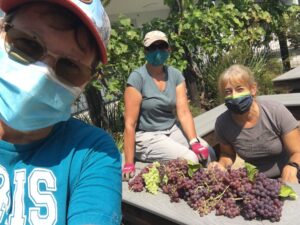
One thing this year has made painfully clear is how precarious a family’s economic stability and well-being can be. COVID-19 abruptly closed our schools and many of our businesses, turning our economy and systems of support upside down and inside out. The end result is that many of our neighbors are struggling to put food on the table.
“Not that food insecurity wasn’t present before, but the pandemic has put it front and center: People need food,” says Montse Archila, who works in Community Health Investment for Providence St. Joseph Health and sits on the steering committee of the Windsor Wellness Partnership. And the reasons are numerous, she adds. Some people have lost income while quarantining with COVID-19. Some work in the service industry in businesses that have had to close under shelter-in-place orders. And others have had to reduce their hours to care for young children unable to attend school.
The Healthcare Foundation recently awarded the Windsor Wellness Partnership a grant through our Emergency Healthcare Fund to support their work to make sure everyone in Windsor has access to healthy food despite this pandemic. This year they’ve rallied their members to create a broad food network, distributing produce and groceries through 10 different sites across Windsor, sharing hundreds of plants in the spring so families could grow their own vegetables, and gleaning excess produce from school gardens to share.
It’s all part of the ongoing effort to make Windsor a healthy, thriving community, which is at the heart of Windsor Wellness Partnership’s mission. Windsor Wellness Partnership is a Sonoma County Health Action chapter and collective of community members, nonprofit organizations and public entities like the Town of Windsor and Windsor Unified School District. One of their focus areas is access to healthy food and that means identifying where needs are in the community and how to work together to meet those needs.
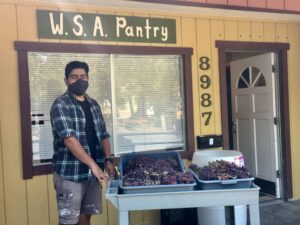
“What we do best is bring people together and share best practices through collective impact,” says Sue McQuiddy, Windsor Wellness Partnership chairperson.
When the Windsor Service Alliance needed to deliver food to seniors but didn’t have the staff capacity to make that happen, the Windsor Wellness Partnership connected them with The Center for Social and Environmental Stewardship. That organization had a senior transportation program already in place with vetted volunteers who could support the food pantry with much-needed food deliveries to seniors.
Meanwhile, the school district, which normally provides snacks and meals to many of its low-income students, has also shifted to distribution. Four hundred families are enrolled in the Windsor Unified School District’s food program. Most surprising to Sue was that 150 of those families were unable to get the food at the locations and times provided by the district and are instead relying on delivery.
Through the Windsor Wellness Partnership, Montse and Sue are hoping to identify and solve these sorts of barriers to accessing food with a comprehensive map that details where food is available, where the need for food is and where there are opportunities to connect people with food. Armed with this data, they hope to build new gardens this spring in public spaces where there are gaps in food resources.
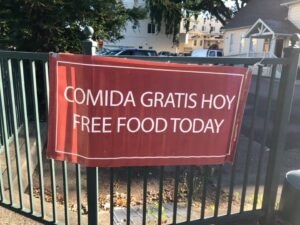
Both Montse and Sue agree that a huge part of this work is establishing trusted relationships with the community and creating a two-way communication channel. It’s important that residents in need know what their options are for food (and the group has widely been distributing a list of current local free food options), but it’s also just as vital that those making infrastructure decisions understand what people are experiencing. A key part of this changing dynamic for breaking barriers to food insecurity is the Windsor Neighborhood Community Program, in which neighborhood captains become conduits for critical information and lived experiences. The long-term plan is that this program will create and sustain small community gardens.
“I want to hear people’s stories. I want to understand what the barriers have been, what the struggles have been,” Montse says. “We belong to a broader network that has resources and wants to help, but without the right engagement work we won’t have the impact we want.”

Related News + Stories
Invest in Our Community
Your support is vital to our collective vision of eliminating health inequities in northern Sonoma County.
Donate
